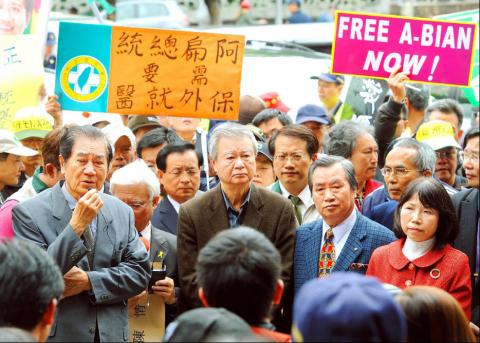Democratic Progressive Party (DPP) lawmakers yesterday called for a release for medical treatment or a prison transfer for former president Chen Shui-bian (陳水扁), who has been suffering health problems during his incarceration.
Chen, who is serving a 17-and-a-half-year sentence for corruption, was granted a seven-day release from Taipei Prison between March 6 and Tuesday last week for a medical checkup. He was found to be suffering from acute coronary syndrome and underwent a cardiac catheterization.
The Ministry of Justice should grant Chen a release for medical treatment on the grounds of human rights and humanitarianism, or arrange for Chen’s transfer to the Taichung Prison, which has a medical facility, DPP lawmakers said at a press conference.

Photo: Fang Pin-chao, Taipei Times
After the press conference, dozens of DPP and Taiwan Solidarity Union lawmakers, as well as about 200 supporters, including representatives from various civic groups, visited the ministry and submitted a letter of appeal to Deputy Minister of Justice Chen Shou-huang (陳守煌) to request a release and transfer.
The former president meets all three requirements for a transfer of prisons, as his spouse is handicapped, his mother is more than 65 years old and he has been released for medical treatment in the past three months, DPP Legislator Yu Mei-nu (尤美女) said.
The lawmakers then returned to the legislature and went to work, with 20 DPP legislators proposing an amendment to the Statute Governing Preferential Treatment to Retired Presidents and Vice Presidents (卸任總統副總統禮遇條例) to preserve preferential medical treatment for former presidents and vice presidents who are imprisoned.
The DPP and civic groups also raised the matter of Chen receiving amnesty, which would have to be granted by President Ma Ying-jeou (馬英九).
DPP Legislator Gao Jyh-peng (高志鵬) cited the cases of many former foreign heads of state, including former US president Richard Nixon, former French president Jacques Chirac and former South Korean presidents Chun Doo-hwan and Roh Tae-woo, who were all involved in scandals, but were granted amnesty by their governments and never served jail terms.
Even the Burmese junta placed Aung Sang Suu Kyi under house arrest rather than send her to prison, Gao said, adding that the Taiwanese government treated its former president worse than Myanmar did its dissidents.
“Premier Chen, do you think former president Chen should be granted an amnesty?” Gao asked Premier Sean Chen (陳冲), who responded that amnesty, according to the Constitution, is a presidential power and that he could not answer the question.
Gao, who was not satisfied with the answer, spent more than 10 minutes repeating the same question, with the premier replying in the same fashion each time.
The premier said he understood that Gao was raising the question on behalf of many supporters of the former president and he pledged to report the amnesty request to Ma.

CHAOS: Iranians took to the streets playing celebratory music after reports of Khamenei’s death on Saturday, while mourners also gathered in Tehran yesterday Iranian Supreme Leader Ayatollah Ali Khamenei was killed in a major attack on Iran launched by Israel and the US, throwing the future of the Islamic republic into doubt and raising the risk of regional instability. Iranian state television and the state-run IRNA news agency announced the 86-year-old’s death early yesterday. US President Donald Trump said it gave Iranians their “greatest chance” to “take back” their country. The announcements came after a joint US and Israeli aerial bombardment that targeted Iranian military and governmental sites. Trump said the “heavy and pinpoint bombing” would continue through the week or as long

TRUST: The KMT said it respected the US’ timing and considerations, and hoped it would continue to honor its commitments to helping Taiwan bolster its defenses and deterrence US President Donald Trump is delaying a multibillion-dollar arms sale to Taiwan to ensure his visit to Beijing is successful, a New York Times report said. The weapons sales package has stalled in the US Department of State, the report said, citing US officials it did not identify. The White House has told agencies not to push forward ahead of Trump’s meeting with Chinese President Xi Jinping (習近平), it said. The two last month held a phone call to discuss trade and geopolitical flashpoints ahead of the summit. Xi raised the Taiwan issue and urged the US to handle arms sales to

State-run CPC Corp, Taiwan (CPC, 台灣中油) yesterday said that it had confirmed on Saturday night with its liquefied natural gas (LNG) and crude oil suppliers that shipments are proceeding as scheduled and that domestic supplies remain unaffected. The CPC yesterday announced the gasoline and diesel prices will rise by NT$0.2 and NT$0.4 per liter, respectively, starting Monday, citing Middle East tensions and blizzards in the eastern United States. CPC also iterated it has been reducing the proportion of crude oil imports from the Middle East and diversifying its supply sources in the past few years in response to geopolitical risks, expanding

Pro-democracy media tycoon Jimmy Lai’s (黎智英) fraud conviction and prison sentence were yesterday overturned by a Hong Kong court, in a surprise legal decision that comes soon after Lai was jailed for 20 years on a separate national security charge. Judges Jeremy Poon (潘兆初), Anthea Pang (彭寶琴) and Derek Pang (彭偉昌) said in the judgement that they allowed the appeal from Lai, and another defendant in the case, to proceed, as a lower court judge had “erred.” “The Court of Appeal gave them leave to appeal against their conviction, allowed their appeals, quashed the convictions and set aside the sentences,” the judges